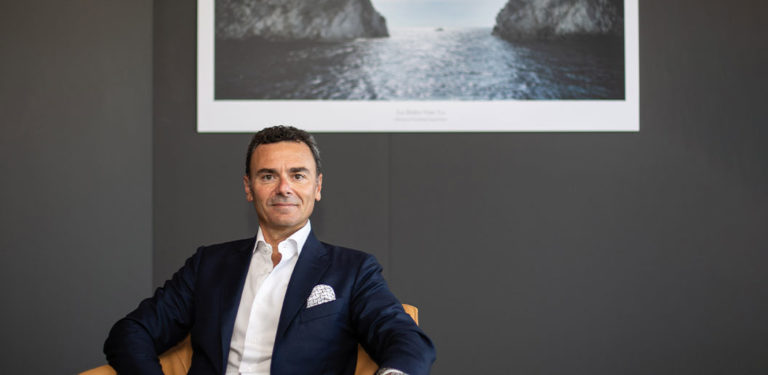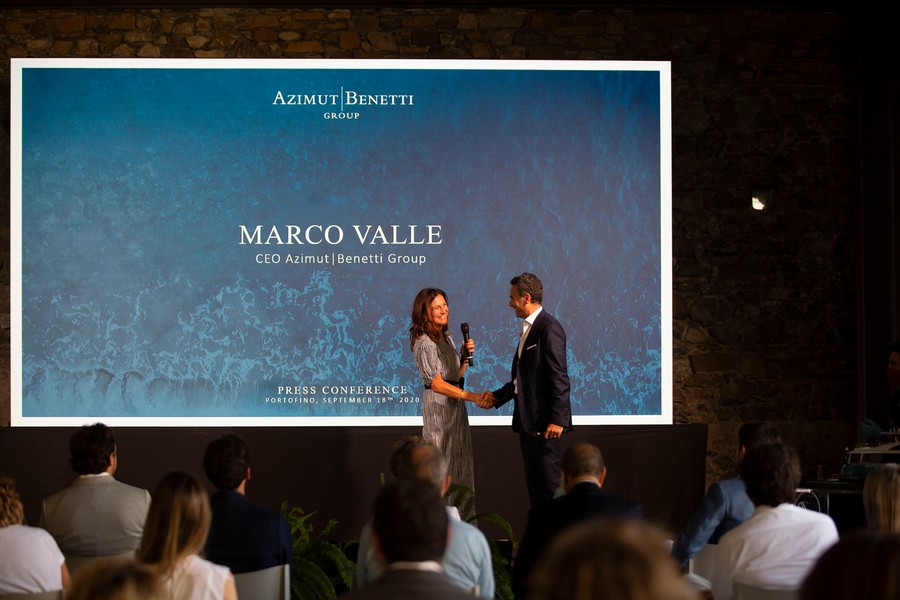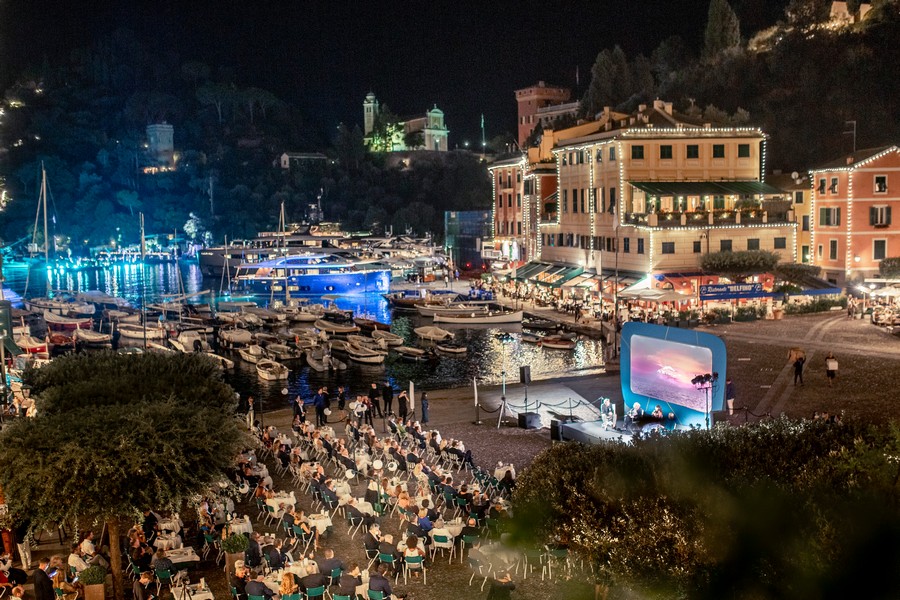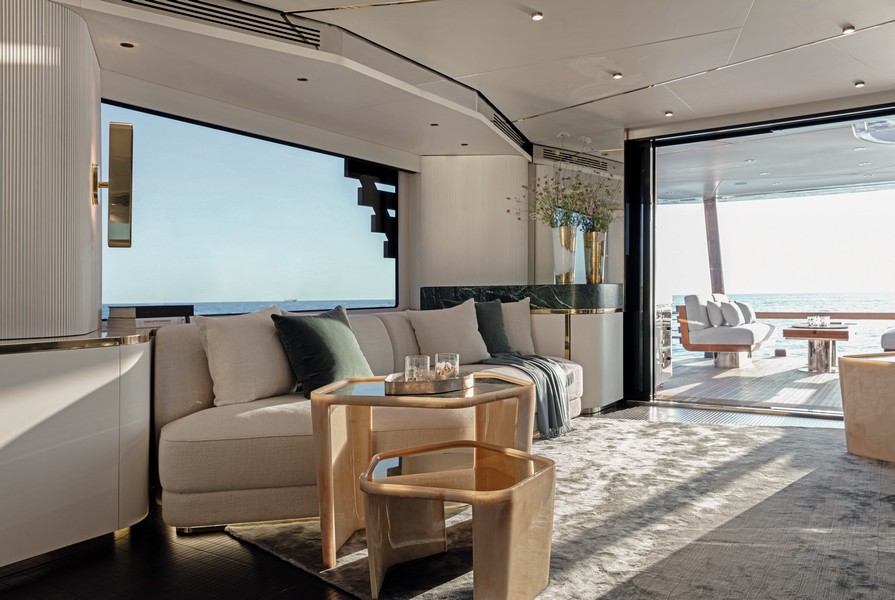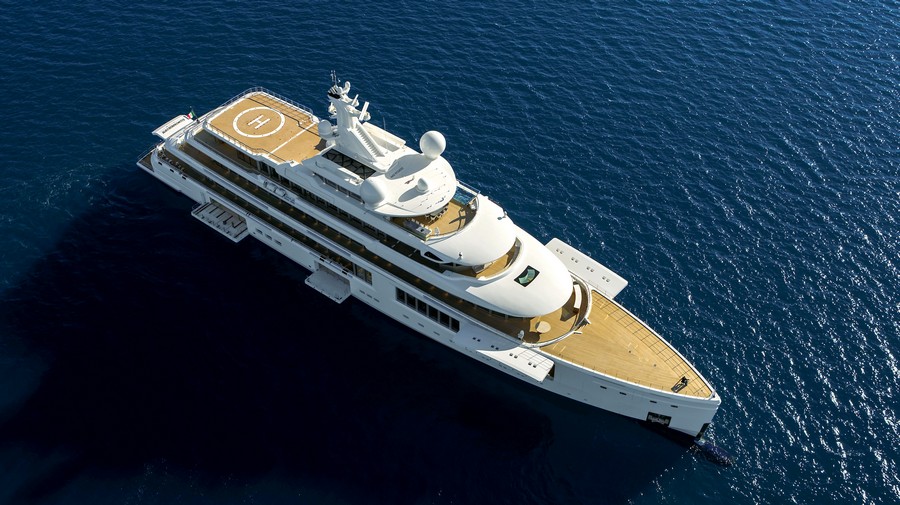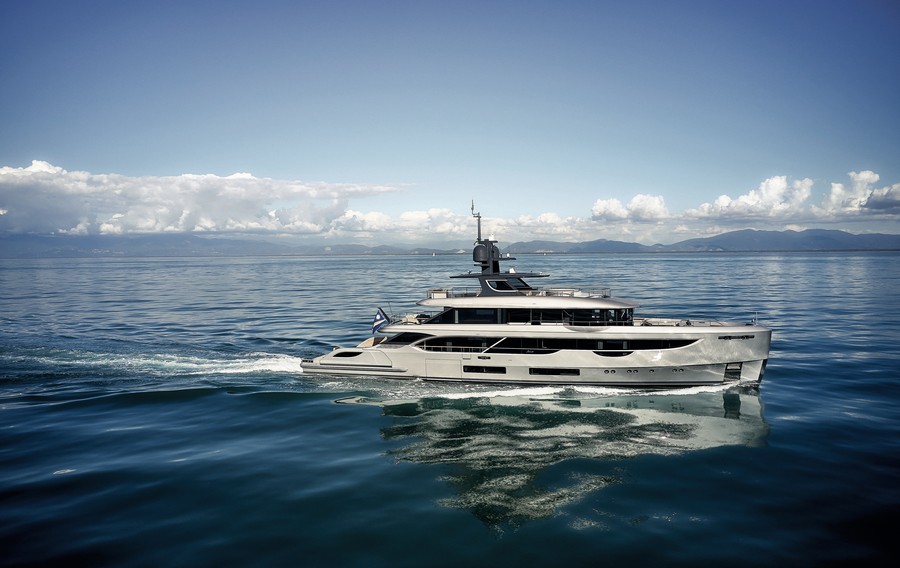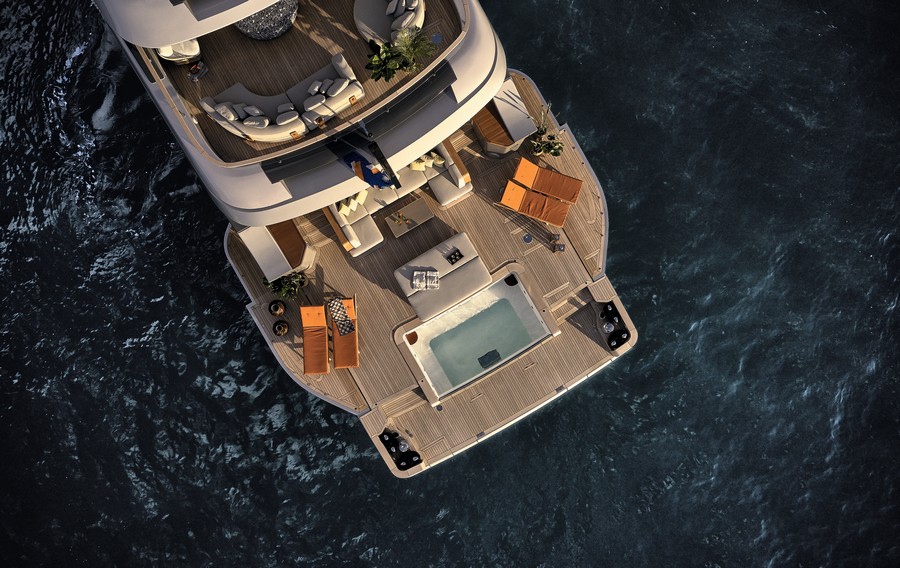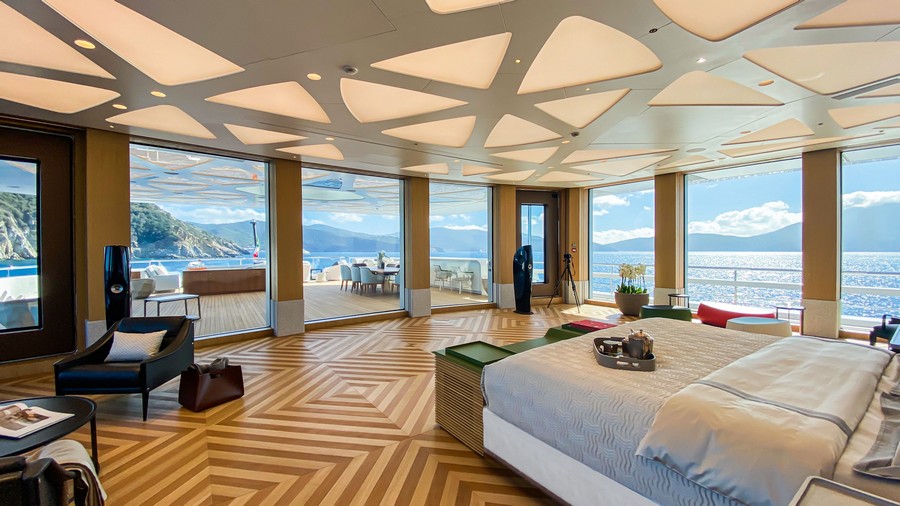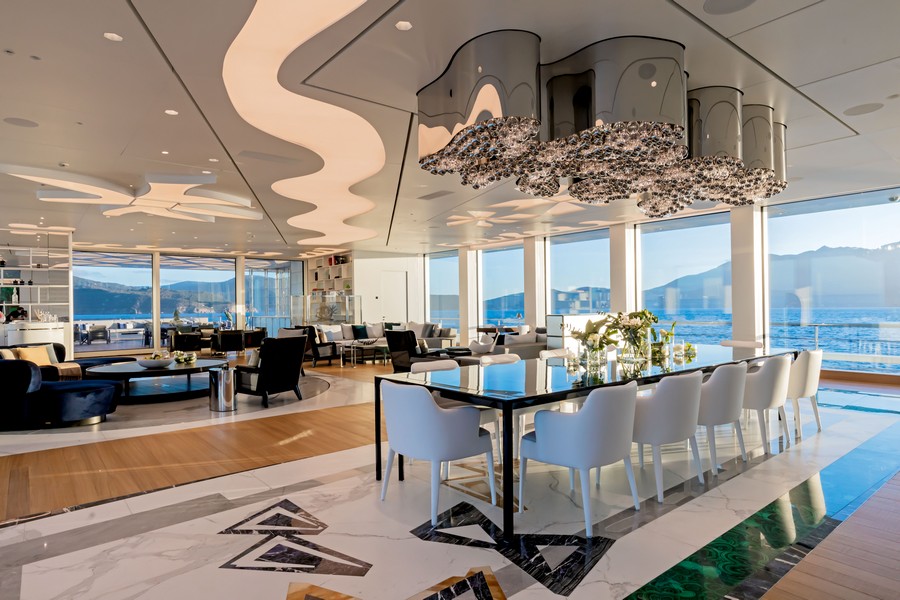After well over two decades with Azimut Yachts, Marco Valle is settling into his new role as CEO of Azimut-Benetti Group, overseeing a huge collection of motor yachts ranging from 34ft to 354ft and managing a family-owned dynasty that shows no signs of slowing down.
INTERVIEW JOHN HIGGINSON PHOTOS AZIMUT-BENETTI GROUP
Firstly, after 24 years with Azimut including four years as CEO, how has your role changed now that you’re CEO of both Azimut and Benetti?
When the Vitelli family offered me the position of CEO of the Group, I was both anxious because of the complexity of the role and fascinated by the challenge. And it was the latter emotion that prevailed.
Leading the entire Group is much more than managing two brands. Benetti and Azimut Yachts are completely different entities and must remain so. My task today is to capitalise on the best practices of both, optimising flows and functions so there’s no unnecessary overlapping and the whole company becomes more agile and efficient.
I travel a lot between the two locations, Avigliana and Livorno, to actively participate in their main activities. Paradoxically, the restrictions linked to Covid that discourage international travel are allowing me to divide my work week equally.
Which parts of the new job have most tested you?
I’ve spent over two decades in Azimut Yachts, so I’m familiar with all the internal mechanisms and most of my senior colleagues. Benetti is a complex reality, with its centuries-old history and production logistics. I am trying to learn the ‘family vocabulary’, which is not to be taken for granted. At the same time, I feel I’ve already established a great relationship with my new colleagues, perhaps because I’m a familiar face.
Did the launches of the Azimut Magellano 25 Metri and Benetti Oasis 40M, soon after you started your new role on September 1, help provide a positive end to a 2020 plagued by Covid?
I think the whole company deserves credit for having had a particularly timely reaction when the pandemic broke out. We were all aware of the need for an immediate change of pace. Each initiative that resulted from this approach is the outcome of a precise strategy. I’m very satisfied with all of the initiatives being a great success, which allowed us to close the year more than satisfied.
In late October, the Group announced an increase in annual turnover in Asia-Pacific including many Azimut Grande deliveries and four Benetti Oasis sales. Why do the Group’s large models hold such a big appeal in this region and how important are dealers such as Marine Italia in Hong Kong?
I believe our success in Asia-Pacific can be attributed to three main factors. One, we know this market very well because we have been present locally long before our competitors. Two, we’re good at distinguishing the tastes and expectations of the market’s customers, so push those models that will most likely meet their approval. Three, we’ve built an excellent network of dealerships – Marine Italia in particular, but not only them – that oversees the area better than most of the competition.
How much has the Group’s overall business been affected by Covid?
Like all Italian shipyards and many other European ones, we stopped for almost two whole months in March and April 2020. When we got back up and running, it was extraordinary to see how much enthusiasm and passion each staff showed on their return, with the firm intention of doing their part to make up for lost time. And we ended the nautical year in substantial balance with the previous fiscal year.
How have Azimut and Benetti changed their business models to adapt to life in the Covid era?
Personally, I think a luxury good such as a yacht must be visited and experienced several times before being purchased. As can happen when it’s necessary to develop a plan B, we discovered the importance of working better on all the touch points of CRM (customer relationship management). We have not changed our business model, but we did implement many important initiatives aimed at creating an even better customer journey.
How did the Azimut Virtual Lounge and e-Boat Show change the way the shipyard communicates with existing and potential owners, as well as dealers?
When we realised many boat shows would be postponed or cancelled, we immediately thought we had to create a virtual experience for our customers, a space we could present our models in detail and an arena for interactive exchanges.
That’s how the Virtual Lounge was born. It was then filled with images and videos, leading to a virtual boat show. This event gave interested and potential customers the opportunity to ask questions directly to dealers and sales managers, and we even closed the sale of an S6!
As for our dealers, we’ve increased contacts and appointments through virtual meetings and sales-school sessions and are developing introductions to the new models entirely dedicated to them.
Can you tell us more about Azimut’s use of BCool engineering?
Our collaboration with the company that produces the BCool system had already been in place before the Covid pandemic, yet we were happy to offer customers the option on the Magellano 25 Metri at a time when they felt its real usefulness.
This innovative Marine Mechanical Ventilation System (MMVS) is based on a NASA patent and was originally developed for use on aerospace missions to sanitise the air on board. The system imitates and reproduces the process that takes place in nature, exploiting the combined action of the rays produced by a special UV lamp and a catalytic structure, without affecting the yacht’s power and consumption. After the success experienced on the Magellano 25 Metri, we are now evaluating how to extend this offer to other models.
Why did Azimut choose to work with Vincenzo De Cotiis and what has been the reaction to his interiors on the Magellano 25 Metri?
At Azimut-Benetti, we like to continually raise the bar. After about a decade of collaborations with designers from sectors other than ours such as retail, luxury real estate and hotels, we met Vincenzo, who is an architect, a designer and a prominent exponent of collectible art.
We were fascinated by his artistic use of fibreglass, the basic material for the development of yachts up to a certain size. Vincenzo put extraordinary passion and great enthusiasm into the project, despite it being his debut in the nautical world.
We worked with four hands, combining his poetic creativity and our constructive know-how, but at no time did Vincenzo forget that the result had to be a yacht, not a house, and he respected all the essential needs of on-board life. I guess this is why clients love the yacht and Vincenzo is already working on the bigger sister, the 30 Metri.
Is the Magellano range now more relevant because of the current desire for greater volume and economy?
The Magellano 25 Metri is selling well and we also recently proposed a ‘Timeless’ version customised by the Azimut style office to respond to US clients’ tastes. I believe that, like the whole Magellano line, this model meets the needs of those who love long cruises.
Magellano is a very seaworthy line. It has large spaces and immense windows. Usually, where there’s technology there’s little aesthetic appeal, but on this yacht, you are surrounded by beauty.
The Magellano line is as silent and reliable as craft intended for long voyages should be.
The model features a great cockpit design that offers an infinity view when the aft panel is lowered. Will we see this on other models?
According to many customers, the cockpit is becoming increasingly important. I’d say there’s a great demand for a subdivision of spaces that blend external and internal areas, a request that arises from a less formal way of living on board. If the cockpit is well designed and finished, it becomes a natural extension of the main saloon, only closer to the waterline. So, for sure, we will see this on the next Magellano and other Collections of both brands.
Tell us about your newly launched Azimut Grande Trideck?
The Trideck is the largest boat ever built by Azimut Yachts, at 38.2m in length and with a 7.9m beam. It’s also the brand’s first three-deck yacht and a symbol of the shipyard’s capacity for design, stylistic and construction innovation.
It has a highly innovative layout, designed for a contemporary owner who seeks constant contact with the outside environment and thinks of their boat as a place of conviviality. Informality, dynamism and flexibility of spaces are the fundamental concepts of this yacht.
What can you tell us about the new Azimut 53 Fly?
The 53 Fly is the new entry model of the Flybridge Collection, so part of a market segment in which Azimut Yachts is a leader. It’s a yacht of almost 17m that entails stylistic content and a layout typical of much larger boats. It offers large volumes while maintaining a sporty appearance and slender lines, with the characteristic Azimut style immediately recognisable. Alberto Mancini has managed to create a yacht that is aesthetically very refined yet defined by functional, comfortable environments that allow the owner to live on board without needing crew. Maximum functionality is combined with refined aesthetics down to the smallest detail
Which Collection is the most important for Azimut in terms of annual turnover?
The success of the brand is guaranteed by the good balance in terms of sales of all Collections. Indeed, one of the distinctive points of the Azimut-Benetti Group and the reason for its success is the breadth and completeness of its range, which starts from 34ft and goes up to 100m and beyond.
With three 100m-plus ‘gigayachts’ built by Benetti, how has the perception of the shipyard changed and are there more megayachts or gigayachts to come?
The ‘gigayachts season’ – as we’ve defined this extraordinary adventure – represents a milestone in the history of Benetti and an achievement that no one would have imagined possible for the Group even five years ago. Building three gigayachts over 100m in parallel and launching them in the space of just 100 days sounds like an epic tale, made possible only by audacity and supreme determination.
It rightfully brings Benetti into the Olympus of the international builders of gigayachts. The creation of these three giants required putting together a brilliant team of experts, a massive investment in terms of advanced industrial processes, and constant attempts to progress.
Numbers don’t lie. The FB272 Luminosity, which has a volume well above 5,500GT, required over 2 million working hours with spikes of more than 400 workers per day and the cooperation of more than 150 specialised international companies. Having acquired this know-how, we are now committed to repeating the experience and we already have something down the road.
Why do you think the new Oasis 40M has proved so popular?
The Benetti Oasis is in line with the changing tastes of customers, who are beginning to value peace and relaxation over formal opulence. In my experience over the last couple of decades, tastes have always changed, but I think we’re now looking at a bigger shift in what people want. They still want something unique but at the same time they want something more relaxed.
The owner and guests can have much easier access to the water, while services on board are much less formal, as are their lives. I think the Oasis platform jumps onto that at just the right time, evidenced by the number of units already sold.
However, the yacht is more than a trendy floating beach club. The Oasis is also great for cruising between ports. It has a cruising speed of 14.5 knots, with a top speed of 15 knots, and a range of 4,000nm at 11 knots.
Which Benetti models are most suitable for Asia?
Benetti is a brand characterised by a great heritage that has always fascinated yacht owners from all over the world. Clients in Asia are no different, although large and custom models are the most popular in the region. In fact, we recently sold a 65m Custom yacht, FB270, which will be the first Benetti built under China Classification Society and Lloyd’s Registry rules. Yet I see Oasis holding a strong appeal, especially for young owners with an idea of life on board being closer to the Mediterranean lifestyle.
What and who is the upcoming B.Yond series most suitable for?
The B.Yond is a new generation of expedition yacht. The project aims to offer an unprecedented level of rationalisation of onboard volumes due to the strict separation of the functions of each deck – lower deck for the crew, main deck for the owner and his guests, upper deck dedicated to the living area.
It boasts volume like a 500GT yacht in only 37m and offers an open design for better views and closer contact with the sea. Yet I think its main feature is the use of new hybrid propulsion expressly created by Siemens for our Group. This meets the expectations of owners who love to live on board in full privacy and are particularly attentive to the issues of sustainability and energy saving.
Finally, which designs or technologies are increasingly important to yacht owners?
Some common traits have emerged in recent years. There’s increased interest in proximity to the sea and making the area close to the water into a real beach club with seats, sofas and so on. Also, there’s a desire for greater connection between interiors and exteriors, using large windows and opening doors, and removing visual obstacles to create a flow.
There’s also increasing attention to consumption and sea pollution. We are the proud builders of Luminosity, the world’s largest hybrid private yacht, and the exclusive users of the best system developed so far in the nautical sector, created by Siemens.
There’s growing interest in gyms and areas intended for yoga, even in prominent areas of the boat. Finally, luxury is now expressed more as attention to details than ostentation or overabundant aesthetics.
Courtesy of Yacht Style
www.yachtstyle.co
www.azimutyachts.com
www.benettiyachts.it


